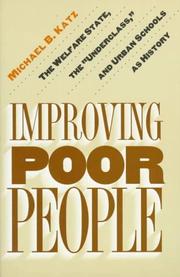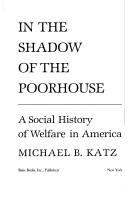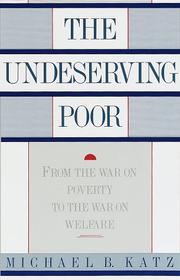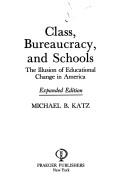| Listing 1 - 10 of 25 | << page >> |
Sort by
|
Book
ISBN: 9780199933952 0199933952 Year: 2013 Publisher: Oxford Oxford University Press
Abstract | Keywords | Export | Availability | Bookmark
 Loading...
Loading...Choose an application
- Reference Manager
- EndNote
- RefWorks (Direct export to RefWorks)
Overview: First published in 1989, The Undeserving Poor was a critically acclaimed and enormously influential account of America's enduring debate about poverty. Taking stock of the last quarter century, Michael B. Katz's new edition of this classic is virtually a new book. As the first did, it will force all concerned Americans to reconsider the foundations of our policies toward the poor, especially in the wake of the Great Recession that began in 2008.Katz highlights how throughout American history, the poor have been regarded as undeserving: people who do not deserve sympathy because they brought their poverty on themselves, either through laziness and immorality, or because they are culturally or mentally deficient. This long-dominant view sees poverty as a personal failure, serving to justify America's mean-spirited treatment of the poor. Katz reminds us, however, that there are other explanations of poverty besides personal failure. Poverty has been written about as a problem of place, of resources, of political economy, of power, and of market failure. Katz looks at each idea in turn, showing how they suggest more effective approaches to our struggle against poverty. The Second Edition includes important new material. It now sheds light on the revival of the idea of culture in poverty research; the rehabilitation of Daniel Patrick Moynihan; the resurgent role of biology in discussions of the causes of poverty, such as in The Bell Curve; and the human rights movement's intensified focus on alleviating world poverty. It emphasizes the successes of the War on Poverty and Great Society, especially at the grassroots level. It is also the first book to chart the rise and fall of the "underclass" as a concept driving public policy.
Social stratification --- Social policy --- Social problems --- United States --- Poor --- Poverty --- Discrimination --- Economic assistance, Domestic --- Pauvres --- Pauvreté --- Aide au développement économique régional --- #SBIB:316.8H15 --- #SBIB:316.8H40 --- Anti-poverty program (United States) --- Welzijns- en sociale problemen: sociale ongelijkheid en armoede --- Sociaal beleid: social policy, sociale zekerheid, verzorgingsstaat --- Pauvreté --- Aide au développement économique régional --- United States of America

ISBN: 0691029946 0691016054 9786612752247 1282752243 1400821703 1400812275 9781400821709 9780691016054 Year: 1997 Publisher: Princeton, NJ
Abstract | Keywords | Export | Availability | Bookmark
 Loading...
Loading...Choose an application
- Reference Manager
- EndNote
- RefWorks (Direct export to RefWorks)
"There are places where history feels irrelevant, and America's inner cities are among them," acknowledges Michael Katz, in expressing the tensions between activism and scholarship. But this major historian of urban poverty realizes that the pain in these cities has its origins in the American past. To understand contemporary poverty, he looks particularly at an old attitude: because many nineteenth-century reformers traced extreme poverty to drink, laziness, and other forms of bad behavior, they tried to use public policy and philanthropy to improve the character of poor people, rather than to attack the structural causes of their misery. Showing how this misdiagnosis has afflicted today's welfare and educational systems, Katz draws on his own experiences to introduce each of four topics--the welfare state, the "underclass" debate, urban school reform, and the strategies of survival used by the urban poor. Uniquely informed by his personal involvement, each chapter also illustrates the interpretive power of history by focusing on a strand of social policy in the nineteenth and twentieth centuries: social welfare from the poorhouse era through the New Deal, ideas about urban poverty from the undeserving poor to the "underclass," and the emergence of public education through the radical school reform movement now at work in Chicago. Why have American governments proved unable to redesign a welfare system that will satisfy anyone? Why has public policy proved unable to eradicate poverty and prevent the deterioration of major cities? What strategies have helped poor people survive the poverty endemic to urban history? How did urban schools become unresponsive bureaucracies that fail to educate most of their students? Are there fresh, constructive ways to think about welfare, poverty, and public education? Throughout the book Katz shows how interpretations of the past, grounded in analytic history, can free us of comforting myths and help us to reframe discussions of these great public issues.
Public welfare --- Social history --- Social policy --- Urban poor --- Urban schools --- Aide sociale --- Histoire sociale --- Politique sociale --- Pauvres en milieu urbain --- Ecoles urbaines --- History --- Histoire --- Social history. --- Social policy. --- History. --- National planning --- State planning --- Descriptive sociology --- Social conditions --- Inner city schools --- City schools --- Economic policy --- Family policy --- Sociology --- Schools --- City dwellers --- Poor

ISBN: 0465032265 0465032257 Year: 1986 Publisher: New York (N.Y.): Basic Books
Abstract | Keywords | Export | Availability | Bookmark
 Loading...
Loading...Choose an application
- Reference Manager
- EndNote
- RefWorks (Direct export to RefWorks)
364 <73> --- Public welfare --- -Social service --- -Benevolent institutions --- Philanthropy --- Relief stations (for the poor) --- Social service agencies --- Social welfare --- Social work --- Human services --- Benevolent institutions --- Poor relief --- Public assistance --- Public charities --- Public relief --- Public welfare reform --- Relief (Aid) --- Welfare (Public assistance) --- Welfare reform --- Social service --- Maatschappelijke hulpverlening--Verenigde Staten van Amerika. VSA. USA --- History --- Government policy --- United States --- Social policy. --- History. --- -Maatschappelijke hulpverlening--Verenigde Staten van Amerika. VSA. USA --- 364 <73> Maatschappelijke hulpverlening--Verenigde Staten van Amerika. VSA. USA

ISBN: 067972561X Year: 1990 Publisher: New York Pantheon
Abstract | Keywords | Export | Availability | Bookmark
 Loading...
Loading...Choose an application
- Reference Manager
- EndNote
- RefWorks (Direct export to RefWorks)
Sociology of social care --- Social stratification --- United States --- Poor --- Poverty --- Discrimination --- Economic assistance [Domestic ] --- United States of America
Book
ISBN: 0674039378 9780674039377 0674750926 9780674750920 9780674750937 0674750934 9780674750937 Year: 1987 Publisher: Cambridge, Mass. Harvard University Press
Abstract | Keywords | Export | Availability | Bookmark
 Loading...
Loading...Choose an application
- Reference Manager
- EndNote
- RefWorks (Direct export to RefWorks)
No detailed description available for "Reconstructing American Education".
Education --- Education, Urban --- Educational sociology --- Bureaucracy --- History.
Book
ISBN: 1283896699 0812205200 0812243862 Year: 2012 Publisher: Philadelphia : University of Pennsylvania Press,
Abstract | Keywords | Export | Availability | Bookmark
 Loading...
Loading...Choose an application
- Reference Manager
- EndNote
- RefWorks (Direct export to RefWorks)
At 1:27 on the morning of August 4, 2005, Herbert Manes fatally stabbed Robert Monroe, known as Shorty, in a dispute over five dollars. It was a horrific yet mundane incident for the poor, heavily African American neighborhood of North Philadelphia-one of seven homicides to occur in the city that day and yet not make the major newspapers. For Michael B. Katz, an urban historian and a juror on the murder trial, the story of Manes and Shorty exemplified the marginalization, social isolation, and indifference that plague American cities. Introduced by the gripping narrative of this murder and its circumstances, Why Don't American Cities Burn? charts the emergence of the urban forms that underlie such events. Katz traces the collision of urban transformation with the rightward-moving social politics of late twentieth- and early twenty-first-century America. He shows how the bifurcation of black social structures produced a new African American inequality and traces the shift from images of a pathological black "underclass" to praise of the entrepreneurial poor who take advantage of new technologies of poverty work to find the beginning of the path to the middle class. He explores the reasons American cities since the early 1970's have remained relatively free of collective violence while black men in bleak inner-city neighborhoods have turned their rage inward on one another rather than on the agents and symbols of a culture and political economy that exclude them. The book ends with a meditation on how the political left and right have come to believe that urban transformation is inevitably one of failure and decline abetted by the response of government to deindustrialization, poverty, and race. How, Katz asks, can we construct a new narrative that acknowledges the dark side of urban history even as it demonstrates the capacity of government to address the problems of cities and their residents? How can we create a politics of modest hope?
City and town life --- Inner cities --- Urban policy --- Sociology, Urban --- Central cities --- Ghettos, Inner city --- Inner city ghettos --- Inner city problems --- Zones of transitions --- Cities and towns --- Urban cores --- Urban sociology --- Cities and state --- Urban problems --- Economic policy --- Social policy --- City planning --- Urban renewal --- City life --- Town life --- Urban life --- American History. --- American Studies. --- Political Science. --- Public Policy. --- Urban Studies.

ISBN: 0275851001 Year: 1975 Publisher: New York Praeger
Abstract | Keywords | Export | Availability | Bookmark
 Loading...
Loading...Choose an application
- Reference Manager
- EndNote
- RefWorks (Direct export to RefWorks)
Year: 1989 Publisher: New York : Pantheon Books,
Abstract | Keywords | Export | Availability | Bookmark
 Loading...
Loading...Choose an application
- Reference Manager
- EndNote
- RefWorks (Direct export to RefWorks)
BMLIK
Book
Year: 1993 Publisher: Princeton : Princeton University Press,
Abstract | Keywords | Export | Availability | Bookmark
 Loading...
Loading...Choose an application
- Reference Manager
- EndNote
- RefWorks (Direct export to RefWorks)
BMLIK
Book
Year: 1973 Publisher: Québec Gouvernement du Québec. Ministère des richesses naturelles
Abstract | Keywords | Export | Availability | Bookmark
 Loading...
Loading...Choose an application
- Reference Manager
- EndNote
- RefWorks (Direct export to RefWorks)
| Listing 1 - 10 of 25 | << page >> |
Sort by
|

 Search
Search Feedback
Feedback About UniCat
About UniCat  Help
Help News
News